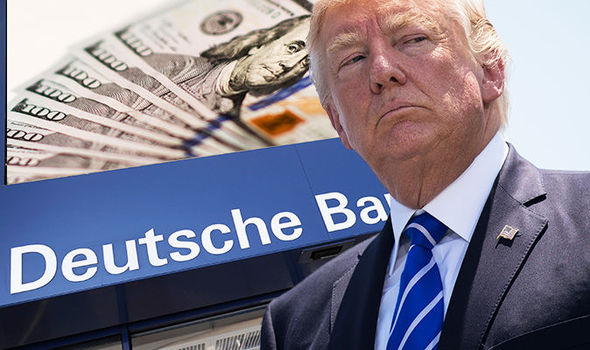Congressional investigators today issued subpoenas to Deutsche Bank and numerous other banks, seeking information about President Trump’s finances and the lenders’ business dealings with Russians.
The subpoenas, from the House’s Intelligence and Financial Services committees, were the latest attempts by congressional Democrats to collect information about the finances of Trump and his family-owned company.
Another House committee is separately seeking Trump’s personal and corporate tax returns.
The committees that issued subpoenas today are jointly investigating Deutsche Bank’s relationship with Trump.
Over the past two decades, Deutsche Bank was the only mainstream bank consistently willing to do business with Trump, who has a long history of defaults and bankruptcies.
The bank has lent him well over $2 billion, and Trump had more than $300 million in outstanding loans from Deutsche Bank by the time he took office, making the German bank the president’s biggest creditor.
Kerrie McHugh, a Deutsche Bank spokeswoman, said the company was “engaged in a productive dialogue” with the committees. “We remain committed to providing appropriate information to all authorized investigations in a manner consistent with our legal obligations,” she said.
Multiple other banks — including Citigroup, JPMorgan Chase and Bank of America — also received subpoenas today, according to two people with knowledge of the subpoenas.
The subpoenas seek records related to business the banks did with a list of suspected money launderers from Russia and other Eastern European countries, according to a person familiar with the subpoenas.
The subpoena to Deutsche Bank had been in the works for months, with congressional investigators negotiating the specific demands with the bank’s lawyers.
When Trump nearly went personally bankrupt in the early 1990s, he left a handful of major U.S. banks on the hook for about $3.4 billion in loans he couldn’t repay (and about $900 million of which he had personally guaranteed).
Hotels, casinos, real estate, an airline and other parts of his debt-ridden portfolio went into bankruptcy protection.
In the wake of that collapse, Trump became a pariah among major U.S. banks, and he had to find unique ways of lining up money for the infrequent and small-bore
deals he pursued thereafter.
That left him borrowing money from labor unions and small, local lenders. Deutsche, keen at the time to make a name for itself in U.S. investment banking and commercial lending, was less hesitant to do business with Trump.
Deutsche’s first transaction with Trump involved a modest renovation loan for 40 Wall Street, a Manhattan skyscraper Trump controls, in 1998.
Trump did little to merit Deutsche’s involvement after that until the early 2000s, when it agreed to loan him as much as $640 million for a Chicago project — the Trump International Hotel and Tower.
Others in Trump’s orbit have also benefited from a relationship with Deutsche Bank; his son-in-law and top adviser Jared Kushner’s floundering real-estate empire has also received massive loans from Deutsche Bank, including $285 million one month before the 2016 election.
